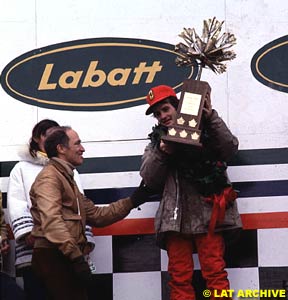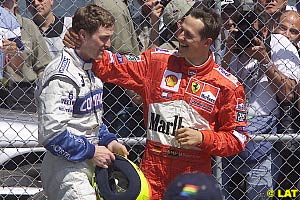
Atlas F1 Magazine Writer
How many drivers have won more than once at the Gilles Villeneuve circuit? What was special about the first race there? And what car number is more likely to win Sunday's race? Marcel Schot brings the answers and more anecdotes on the Canadian Grand Prix
Qualifying could see a return to the throne for Michael Schumacher after two straight starts from the second row. In Montreal, the German has already scored six poles. In the last eight years, he only missed pole in 1996 and 1998. Last year, the Ferrari driver was the only driver in the 1:15s. The grid of last year's Canadian Grand Prix was a curious one, since it was the only race to show four different makes on the first two rows. Behind Schumacher's Ferrari, Ralf Schumacher (Williams), David Coulthard (McLaren) and Jarno Trulli (Jordan) completed the first four.
In 1997 Villeneuve Jr. completely missed his braking point at the start of the second lap, ending the race early when he flew straight into the wall. The next year his missed a corner once again, this time without damage but after mistakenly rejoining the race in front of a pack of cars, Minardi driver Esteban Tuero ran into his back. After a seven minute pitstop, Villeneuve was able to finish the race, but three laps down. A year later, anger got the better of him, when he chased Pedro Diniz too hard after the Brazilian had overtaken him under yellow. Villeneuve wanted to drive faster than his BAR could take him and slid off into retirement.
In 2000 things went pretty much similar. When it rained in the later stages of the race, Villeneuve simply pushed too hard. At the hairpin, the BAR driver missed his brake point and t-boned into Ralf Schumacher's Williams. Both drivers retired on the spot with just five laps to go. Villeneuve was reprimanded by the stewards of the meeting for having caused the accident and a 25 second penalty was issued, however with no effect.
Last season was the first time that Villeneuve retired in Canada without being the reason himself. After a horrible start, he slowly moved up the field, until his driveshaft broke halfway through the race.
Canadian success in Formula One has always been synonymous with the name Villeneuve, but Gilles and Jacques weren't the only Villeneuves driving their home Grand Prix. Gilles's brother, also called Jacques, participated in 1981 and 1983. In 1981 he replaced Siegfried Stohr at Arrows, but was unable to qualify because the Arrows suffered from brake problems. Two years later, he returned for another one-off after RAM driver Eliseo Salazar suffered from cash-flow problems. This time, no car trouble was necessary to keep Villeneuve from the grid, since the RAM was simply too slow.
However, the two have shared the front row of the grid more often. Michael was ahead four times (Brazil, Canada, Europe and USA, all in 2001), while Ralf took the better side of the grid once, in France 2001. All in all, it remains to be seen if Ralf can make it two in a row in Montreal. So far only his brother (1997-98) and Alan Jones (1979-80) have achieved a consecutive repeat.
On a slight return to Gilles Villeneuve, we see that the car number 27, which is always strongly connected to Gilles and Ferrari, is somehow more succesful in Canada than in other places. Throughout history, a car with number 27 has been victorious 25 times - five of those came in Canada: Alan Jones (1979,80), Michele Alboreto (1985), Ayrton Senna (1990) and Jean Alesi (1995). Gilles Villeneuve won twice with his magic number, in Monaco and Spain, both in 1981.
If we look at the number of wins per starting number, the number 1 is of course the most victorious, since it's usually the number of the reigning World Champion. However, number five comes very close. This can be attributed to Williams spending many of the season in which they dominated with the numbers five and six. The relative success of higher numbers 11 and 12 is because the black and gold JPS Lotuses carried them.
With the numbers one and five being the two most victorious numbers in Formula One history, now assigned to Michael and Ralf Schumacher respectively, there's a good chance we can look forward to another brotherly battle in this coming Canadian Grand Prix.
This year the Grand Prix circus arrives in Montreal for the 24th time. In the previous 23 years, only four drivers have won more than once at the Circuit Gilles Villeneuve. Alan Jones (1979-80), Nelson Piquet (1982,84,91), Ayrton Senna (1988,90) and Michael Schumacher (1994,97,98,2000) can be considered the masters of Montreal. Of the circuits with twenty or more hosted races, that gives Montreal the second lowest percentage of multiple winners against race winners. Only in Buenos Aires it proved harder to win twice.
Circuit Multiple Race Percentage
Winners Winners
Buenos Aires 3 16 18.8%
Montreal 4 16 25.0%
Kyalami 4 15 26.7%
Hockenheim 5 18 27.8%
Interlagos 4 14 28.6%
Nurburgring 7 21 33.3%
Silverstone 8 22 36.4%
Spa-Francorchamps 7 19 36.8%
Zandvoort 7 19 36.8%
Watkins Glen 5 13 38.5%
Monza 14 31 45.2%
Monte-Carlo 11 24 45.8%
Imola 6 13 46.2%
 The first race in Montreal was a special one, and that has everything to do with the driver who's name the circuit carries nowadays : Gilles Villeneuve. The local hero took his first win in 1978, and it wasn't an easy one. His son, Jacques, wasn't quite as lucky on his home circuit.
The first race in Montreal was a special one, and that has everything to do with the driver who's name the circuit carries nowadays : Gilles Villeneuve. The local hero took his first win in 1978, and it wasn't an easy one. His son, Jacques, wasn't quite as lucky on his home circuit.
 Speaking of family ties: last year's race saw the first one-two among brothers in Formula One history. In a race where Ralf Schumacher's Williams proved simply too strong for big brother Michael, the younger of the two brothers went home with the victory. Two races later in France the roles were reversed, while Michael led his brother this season in Brazil, making the Schumacher score 2-1 in favour of the older brother.
Speaking of family ties: last year's race saw the first one-two among brothers in Formula One history. In a race where Ralf Schumacher's Williams proved simply too strong for big brother Michael, the younger of the two brothers went home with the victory. Two races later in France the roles were reversed, while Michael led his brother this season in Brazil, making the Schumacher score 2-1 in favour of the older brother.
# Wins
1 109
5 101
2 58
3 44
8 41
6 40
12 36
11 35
4 26
7 25
27 25
28 16
15 14
20 14
10 11
16 11
9 10
other 71
Past Performance by Current Drivers
| 1996 | 1997 | 1998 | 1999 | 2000 | 2001 | Average Qualifying Position |
|||||||
| Qual | Race | Qual | Race | Qual | Race | Qual | Race | Qual | Race | Qual | Race | ||
| M.Schumacher | 3 | M | 1 | 1 | 3 | 1 | 1 | R | 1 | 1 | 1 | 2 | 1.666 |
| Barrichello | 8 | R | 3 | R | 13 | 5 | 5 | R | 3 | 2 | 5 | R | 6.166 |
| Coulthard | 10 | 4 | 5 | 7 | 1 | M | 4 | 7 | 2 | 7 | 3 | M | 4.666 |
| Raikkonen | - | - | - | - | - | - | - | - | - | - | 7 | 4 | 7.000 |
| R.Schumacher | - | - | 7 | R | 5 | M | 13 | 4 | 12 | 14 | 2 | 1 | 8.000 |
| Montoya | - | - | - | - | - | - | - | - | - | 10 | R | 10.000 | |
| Heidfeld | - | - | - | - | - | - | - | - | 21 | M | 11 | M | 16.000 |
| Massa | - | - | - | - | - | - | - | - | - | - | - | - | - |
| Fisichella | 16 | 8 | 6 | 3 | 4 | 2 | 7 | 2 | 10 | 3 | 18 | R | 10.166 |
| Sato | - | - | - | - | - | - | - | - | - | - | - | - | - |
| Villeneuve | 2 | 2 | 2 | R | 6 | 10 | 16 | R | 6 | 15 | 9 | R | 6.833 |
| Panis | 11 | M | 10 | 11 | 15 | R | 15 | 9 | - | - | 6 | M | 11.400 |
| Trulli | - | - | 20 | M | 14 | R | 9 | R | 7 | 6 | 4 | 11 | 10.800 |
| Button | - | - | - | - | - | - | - | - | 18 | 11 | 20 | M | 19.000 |
| Frentzen | 12 | M | 4 | 4 | 7 | R | 6 | 11 | 5 | M | DNS | DNS | 6.800 |
| Bernoldi | - | - | - | - | - | - | - | - | - | - | 17 | M | 17.000 |
| Irvine | 5 | M | 12 | R | 8 | 3 | 3 | 3 | 16 | 13 | 15 | R | 9.833 |
| de la Rosa | - | - | - | - | - | - | 20 | M | 9 | R | 14 | 6 | 14.333 |
| Yoong | - | - | - | - | - | - | - | - | - | - | - | - | - |
| Webber | - | - | - | - | - | - | - | - | - | - | - | - | - |
| Salo | 14 | M | 17 | M | 17 | R | - | - | 15 | M | - | - | 15.750 |
| McNish | - | - | - | - | - | - | - | - | - | - | - | - | - |
Please Contact Us for permission to republish this or any other material from Atlas F1.
|
Volume 8, Issue 23
Atlas F1 Exclusive
Interview with Dickie Stanford
Jo Ramirez: a Racing Man
Articles
Blind Spot for Bernoldi
Canadian GP Preview
Canadian GP Preview
Local History: Canadian GP
Canada Stats and Facts
Technical Focus: Tyre Technology
Columns
The Canadian GP Quiz
Bookworm Critique
Elsewhere in Racing
The Grapevine
> Homepage |